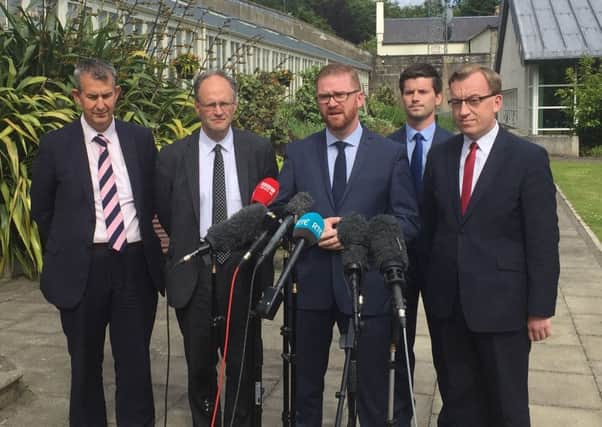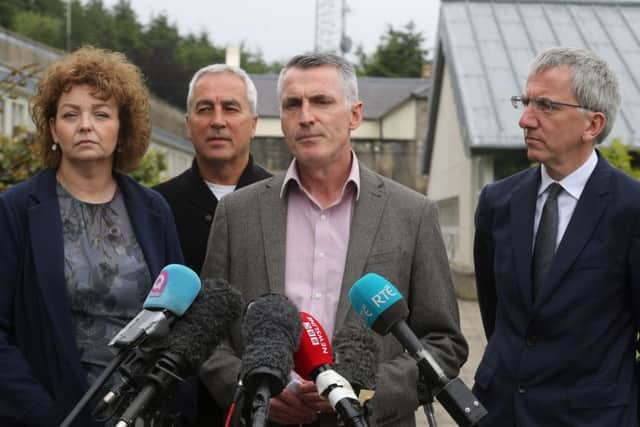Parties still divided on a number of issues


Negotiations are set to continue as parties mount a last-ditch effort to strike a deal ahead of Thursday’s deadline.
Talks extended late into Tuesday night at Stormont Castle in Belfast, as they did on Monday, but there was little sign of a breakthrough that would lead to the restoration of a devolved executive.
Advertisement
Hide AdAdvertisement
Hide AdThe republican party has accused the DUP of refusing to budge on any of the substantive issues at the heart of the crisis.


For its part, the DUP urged Sinn Fein to stop indulging in “high-wire acts” and get down to the job of delivering for the people of Northern Ireland.
Sinn Fein party chair Declan Kearney did hint movement was possible on one precondition - its opposition to DUP leader Arlene Foster returning as Stormont first minister - if the DUP gave ground on other matters.
DUP negotiator Edwin Poots suggested a “parallel process” could be initiated where a coalition executive is formed while talks on the outstanding issues continued.
Advertisement
Hide AdAdvertisement
Hide AdLogjams include Sinn Fein’s demand for legislative protections for Irish language speakers and the question of whether Mrs Foster can return to the first minister’s office while a public inquiry into a botched green energy scheme is ongoing.


The parties have until 4pm on Thursday to restore a devolved executive or Northern Ireland faces the prospect of a return of direct rule from London.
Mr Kearney claimed the DUP was not prepared to move on republican demands for a stand-alone Irish Language Act, the introduction of same-sex marriage in Northern Ireland and the introduction of a specific bill of rights for the region.
“The DUP have not moved on any of the substantive issue which sit at the heart of this crisis,” he said.
Advertisement
Hide AdAdvertisement
Hide Ad“They haven’t moved on any of the fundamental rights and equality issues that require to be embraced.”
Asked if Sinn Fein was prepared to drop its opposition to Mrs Foster returning as first minister while the Renewable Heat Incentive (RHI) was ongoing, Mr Kearney stressed the urgent need was to address the “rights and equality” issues.
But he added: “In those circumstances, if in fact we can find resolution and progress on all of the fundamental issues, then we can address the issue of the future role of the DUP leader in a possible future executive but at this point that question is academic.”
Mr Poots indicated talks were not running smoothly
“I can’t say they are easy but nonetheless we want to get Stormont up and running and we can get it up and running straight away and distribute the money our DUP have successfully received from the UK government,” he said.
Advertisement
Hide AdAdvertisement
Hide Ad“We believe we need to be respectful of all cultures and all traditions across Northern Ireland and are working hard to find a means through that and ensure that we can continue to deliver.
“I would encourage Sinn Fein to be mature, no high-wire acts, let’s get down to work, knuckle down and find a way through this, and it is possible if people apply themselves.”
Northern Ireland Secretary James Brokenshire warned that time was running short to strike a deal.
While negotiations involve the five main Northern Ireland parties and the UK and Irish governments, their fate hinges on whether the two biggest parties, the DUP and Sinn Fein, can resolve their differences.
Advertisement
Hide AdAdvertisement
Hide AdThe peace process is littered with examples of apparently firm political deadlines being broken.
While Mr Brokenshire stressed the cut-off point was set in law, he did not definitively rule out another extension.
“It was an act of parliament that set that and therefore it is that very clear deadline that we are seeking to ensure is met,” he said.
Mrs Foster was forced from office in January when Sinn Fein’s then deputy first minister, the late Martin McGuinness, quit in protest at the DUP’s handling of the RHI - a scheme that left the administration facing a £490 million overspend.
His move triggered a snap Assembly election in March.
Advertisement
Hide AdAdvertisement
Hide AdA number of attempts to restore powersharing in the wake of that poll floundered, with three UK Government deadlines for a deal having already been missed.
It remains unclear what impact the DUP’s Westminster parliamentary deal with the Conservative Party will have on efforts to restore powersharing.
While rival Stormont parties have largely welcomed the additional £1 billion investment flowing from the confidence and supply agreement, concerns have been raised as to whether the UK Government has fatally compromised its stated commitment to impartiality in its dealings with Northern Ireland parties.
Here are wrangles at the heart of the Stormont crisis;-
:: Irish Language Act
Sinn Fein want a stand-alone piece of legislation that would enshrine protections for Irish language speakers.
Advertisement
Hide AdAdvertisement
Hide AdThe DUP appears willing to legislate, but only if the Ulster Scots language is also included.
The issue has become a touchstone for a wider debate on respect for Irish and British cultures in post-conflict Northern Ireland.
Sinn Fein accuses the DUP of treating the nationalist tradition with contempt, on the other hand, the main unionist party claims republicans have politicised the Irish language for their own ends.
:: Same sex marriage
Northern Ireland is the only part of the UK and Ireland where same-sex marriage remains outlawed.
Advertisement
Hide AdAdvertisement
Hide AdThe DUP has used the voting mechanism to prevent a law change, despite a majority of MLAs supporting the move at the last vote at Stormont.
Following March’s snap Assembly election, the DUP no longer has the electoral strength to deploy a petition of concern in its own right, though it could still potentially combine with other socially conservative MLAs to do so, if and when powersharing is restored.
While Sinn Fein wants the DUP to stop blocking a law change, the DUP insists it is protecting the traditional definition of marriage.
:: Bill of Rights
Sinn Fein believe a Bill of Rights is an unfulfilled element of the 1998 Good Friday Agreement.
Advertisement
Hide AdAdvertisement
Hide AdThe DUP is not ideologically opposed to enshrining human rights protections but only if, in its view, they represent the interests of all section of society.
The have dismissed previous suggested formats as “left-wing wish lists”.
The party has also previously raised concern that a separate Northern Ireland Bill might create a “disparity” with human rights legislation elsewhere in the UK.
Sinn Fein also wants the re-establishment of a forum to allow civic society to contribute to the political process.
:: Renewable heat incentive
Advertisement
Hide AdAdvertisement
Hide AdWhile a public inquiry has been called into the financial furore around Stormont’s ill-fated green energy scheme, an initiative that landed the executive with a potential £490 million overspend bill, the issue that brought down the administration is still causing political friction.
Sinn Fein had insisted it would not re-enter a coalition with DUP leader Arlene Foster as first minister until her role in the RHI (she oversaw its inception when economy minister) is investigated.
The DUP has branded that stance as an “unacceptable precondition” and said if republicans want to veto its choice of first minister it would return serve, and block Sinn Fein’s choice of deputy first minister.
On Tuesday, Sinn Fein hinted it could give ground on this issue if it achieves movement on other outstanding issues.
:: Legacy
Advertisement
Hide AdAdvertisement
Hide AdGiven the parties’ different perspectives on the past, it is notable that quite a lot has already been agreed on how to deal with the toxic legacy of the Troubles.
The problem is while a raft of initiatives, including a new investigatory body, a truth recovery mechanism and an oral achieve, have been agreed, they are stuck in the starting blocks due to a small number of discreet impasses.
This dispute also involves the UK government.
One of the main ones is the thorny issue of national security and republican fears the government would cite that as a reason to withhold documents to bereaved families.
Claims made by unionists and Tory backbenchers that recent prosecutions of former British soldiers is tantamount to a “witch-hunt” have further complicated the picture, with the government facing calls to introduce a statute of limitations on prosecutions of former security force members.
Advertisement
Hide AdAdvertisement
Hide AdA suggested public consultation exercise on the proposed legacy mechanisms would not fully resolve the issues, but it could move it on enough to give space to enable an executive to be formed.
:: Brexit
With the parties taking opposing positions in the EU referendum (DUP - Leave/Sinn Fein - Remain) it came as a surprise that they were able to adopt a joint approach to the issue when Arlene Foster and Martin McGuinness penned a letter to Theresa May last year.
The letter highlighted the need to protect cross-border trade links and stressed the need to retain access to sources of skilled and unskilled labour in the EU.
The vulnerability of an agri-food sector reliant on EU subsidies was also raised, as were concerns that a proportion of billions of euro of EU funds for projects in Northern Ireland may not be drawn down.
A lot of water has flowed under the bridge since then.
Advertisement
Hide AdAdvertisement
Hide AdSinn Fein’s demand for special designated EU status for Northern Ireland post-Brexit has raised unionist concerns that republicans’ real motive is to drive a wedge between the region and the rest of the UK.
The fact Brexit has now been caught up in a reignited debate about a united Ireland has also polarised the issue.
While a joint approach is now highly unlikely, it is doubtful Brexit alone would stand in the way of a new executive being formed.